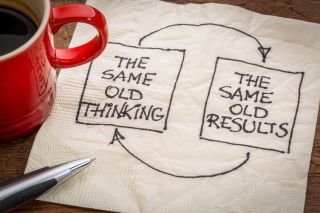Embarrassment
Change Without Shame
Self-compassion provides a better approach to reviving self-care resolutions.
Posted January 29, 2023 Reviewed by Jessica Schrader
Key points
- Many of us approach change through self-shame.
- Shame activates our fear-response system, which is counterproductive to lasting change.
- Science shows us that self-compassion is a more effective approach.
As January wanes, so too may your resolve for positive change dwindle. For many of us, January starts with a ray of hope and a determination to do better, be better, and adopt all the personal life changes we know will ground us in our best selves. And yet, as the days begin to multiply, our determination fades, and we may find ourselves back where we started, or, even worse, now blaming ourselves for not being able to follow through with all the transformative habits we know will make us happier. We blame or judge ourselves, never questioning if it is our approach itself that is the problem.

All too often, to our detriment, our approach is built on self-shame, loathing ourselves for the behaviors we want to change. However, a brief look at the science behind change shows us that change based on self-shame sets us up for failure, and a self-compassionate approach to change sets us up for success.
Understanding that the psychophysiology of your mind-body complex heavily influences your thoughts, behaviors, and actions is essential. What does that mean? It means that your mind and body cannot be separated when it comes to emotional experience; together, they work as a system that perceives reality from its dominant state. Sometimes this perception is positive and hopeful, and sometimes it only sees problems and stress.
This dominant state can be one of two systems built deep into you and guide your existence. It is important to note that you cannot be in both systems at once because, psycho-physiologically speaking, they are opposite. Also, the one you are in most often becomes the overriding system of your life.
The first is your fear-response system. You may have heard of your fear response system; it is often called your fight-or-flight response. When you are in this drive, your stress hormone cortisol is dominant, you have a restricted view, seeing only your stress, you exhibit feelings of powerlessness and hopelessness, you have the inability to concentrate, you feel on edge, and stress interferes with your pursuits. You probably know this system because you have felt it.
The second guiding system of your mind/body complex is your calm and connection system. When you are rooted in your calm and connection system, you have an enhanced ability to cope, you experience creativity, you have greater flexibility in thinking, you see solutions and opportunities instead of restrictions, and you exhibit resilience, optimism, and problem-solving skills. You have probably experienced this system, as well—it is often described as being at your best self.

Emotional states create a feedback loop with each of these systems. In other words, the more you are in any emotional state, the more you activate the system associated with that state—which creates a greater capacity to experience that or similar emotions. For example, you are creating a greater capacity to see the world from a lens of stress and fear when mired in your fear-response system. Conversely, when grounded in your calm and connection system, you see the world through a lens of opportunity and possibility—and make choices and decisions from that lens.
How do these two drives impact your ability to sustain long-term change? Unfortunately, many people approach change from a shame-based perspective, i.e., "I hate my body," "I am a total screwup who drinks too much," "I am lazy and out of shape," "I'm a slob," "I'm a disorganized mess," and the list goes on. This approach is counterproductive because self-shame is an emotion grounded in your fear response system and will elicit all its associated behavioral characteristics. You only see the problem and its stress.
Your sense of self-efficacy diminishes, and you may become disassociated from your original desire to change or believe it is possible. Although cortisol, the primary hormone associated with your fear-response system, may initially function as a motivator for change, it will likely diminish once you feel better, and you will lose your impetus to sustain that change.

On the other hand, self-compassion is an emotion grounded in your calm and connection system. When you approach change from a place of self-compassion and understanding, you are more likely to see solutions and opportunities instead of only seeing the problem. As a result, you will cope better, exhibit creativity and optimism, be more resilient, and problem-solve better.
Furthermore, dopamine, serotonin, and oxytocin are the primary neurotransmitters and hormones of your calm and connection system. These biochemicals are associated with feeling better, a more positive outlook for the future, behavioral control, and self-trust—characteristics much more conducive to change.
Admittedly, some of us may be dealing with problematic behaviors that are self-destructive and are hard to approach from a state of self-compassion. However, separating "you" from the behavior is important in this instance. In other words, replace "I am a bad person because I do such and such" with "there is a piece of me that behaves in a way that is not good for my mental or physical health." And then try to hold that piece in a state of self-compassion and understanding. If you still struggle with a self-compassionate approach, you may want to seek the help of a "trusted other" or therapist.

As we leave January and head into February, it is a perfect time to revive your resolutions for self-care. Approaching positive personal change through self-compassion, self-understanding, and self-love is the first step in creating lasting change.




